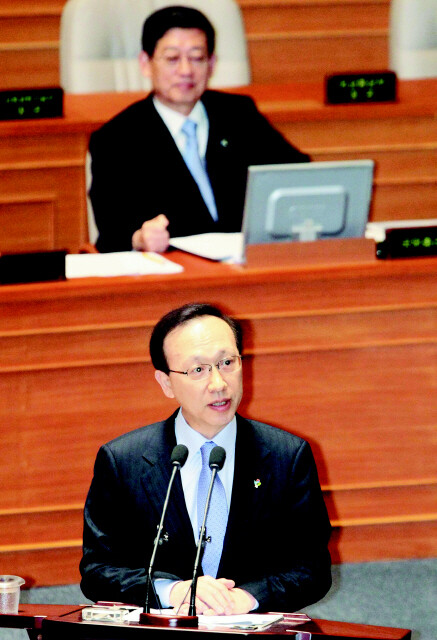hankyoreh
Links to other country sites 다른 나라 사이트 링크
Break with S.Korea evidence of NDC’s central role

By Son Won-je, Staff Writer
Following North Korea’s unexpected actions, attention is focusing on the fact that the National Defense Commission (NDC), the country’s supreme authority, took the initiative in terminating inter-Korean relations.
In a May 30 spokesperson’s statement, the NDC announced the breakdown of inter-Korean relations, stating that it would “no longer associate with the Lee Myung-bak administration.” On June 1, it emphatically declared the termination of inter-Korean relations with its revelations about secret contacts in the form of a response to a question by a Korea Central News Agency journalist.
Analysts are saying this prominent role by the NDC is intended to drive home the point that the discontinuation of relations with the Lee administration is an established strategy with the support of the country’s supreme leader, NDC Chairman Kim Jong-il.
Other analysis suggest that the NDC’s central role goes beyond the merely symbolic to signify a shift in center toward the NDC for North Korea’s decision-making on inter-Korean relations and other foreign policy.
“It has been determined that a core organization of powerful figures, similar to the U.S. National Security Council, that reports directly to Kim Jong-il has been formed in the North Korean National Defense Commission,” said a high-ranking intelligence source.
“It appears that foreign ministry figures like Kang Sok-ju and Kim Kye-kwan are just figureheads, and the real foreign policy framework is decided here,” the source added.
“We are also noting the fact that this statement from North Korea about the severing of dialogue came from the NDC,” the source said.
The rise of the NDC means a gain in strength for South Korea strategy centering on military hard liners.
“The Unified Front Department of the Workers’ Party of Korea, which has handled inter-Korean relations in North Korea to date, has tended to favor using the thawing of relations with Seoul as a starting point for improving its foreign relations as a whole, including its relations with the United States,” said a government official. “The military, in contrast, favors extracting concessions from Seoul and direct involvement from Washington through pressure on the South.”
“In this case, it looks as though Kim Jong-il lent support to his successor,” the official added.
Meanwhile, the ruling Grand National Party (GNP) has been discomfited by the actions of the Lee Myung-bak administration, which invited questions about attempted secret meetings and expedient resolution of the Cheonan sinking and Yeonpyeong Island shelling after previously dismissing the North Korea policy of the Kim Dae-jung and Roh Moo-hyun administrations as “cash funneling” and pledging to conduct matters differently.
“The very fact that they gave North Korea an excuse to make these revelations is a problem,” a lawmaker said.
“Not only does it go against the banner they have hoisted to date, it is also an extremely incompetent and amateurish handling of North Korea issues,” the lawmaker added.
Please direct questions or comments to [englishhani@hani.co.kr]
Editorial・opinion
![[Guest essay] The real reason Korea’s new right wants to dub Rhee a founding father [Guest essay] The real reason Korea’s new right wants to dub Rhee a founding father](https://flexible.img.hani.co.kr/flexible/normal/500/300/imgdb/original/2024/0423/8317138574257878.jpg) [Guest essay] The real reason Korea’s new right wants to dub Rhee a founding father
[Guest essay] The real reason Korea’s new right wants to dub Rhee a founding father![[Column] ‘Choson’: Is it time we start referring to N. Korea in its own terms? [Column] ‘Choson’: Is it time we start referring to N. Korea in its own terms?](https://flexible.img.hani.co.kr/flexible/normal/500/300/imgdb/original/2024/0423/3617138579390322.jpg) [Column] ‘Choson’: Is it time we start referring to N. Korea in its own terms?
[Column] ‘Choson’: Is it time we start referring to N. Korea in its own terms?- [Editorial] Japan’s rewriting of history with Korea has gone too far
- [Column] The president’s questionable capacity for dialogue
- [Column] Are chaebol firms just pizza pies for families to divvy up as they please?
- [Column] Has Korea, too, crossed the Rubicon on China?
- [Correspondent’s column] In Japan’s alliance with US, echoes of its past alliances with UK
- [Editorial] Does Yoon think the Korean public is wrong?
- [Editorial] As it bolsters its alliance with US, Japan must be accountable for past
- [Guest essay] Amending the Constitution is Yoon’s key to leaving office in public’s good graces
Most viewed articles
- 1Samsung barricades office as unionized workers strike for better conditions
- 2[Editorial] Japan’s rewriting of history with Korea has gone too far
- 3[Column] The president’s questionable capacity for dialogue
- 4[Reporter’s notebook] Did playing favorites with US, Japan fail to earn Yoon a G7 summit invite?
- 5[Column] The clock is ticking for Korea’s first lady
- 6Korean government’s compromise plan for medical reform swiftly rejected by doctors
- 7[Column] Are chaebol firms just pizza pies for families to divvy up as they please?
- 8Why Korea shouldn’t welcome Japan’s newly beefed up defense cooperation with US
- 9[Column] Has Korea, too, crossed the Rubicon on China?
- 10US overtakes China as Korea’s top export market, prompting trade sanction jitters